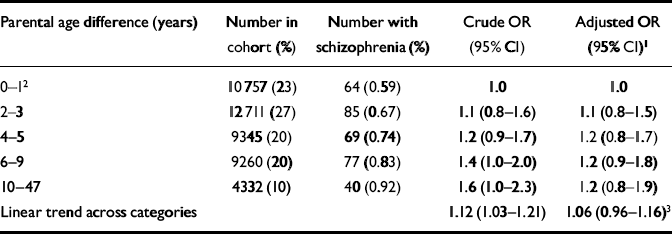Dr Bourne suggests that as advancing paternal, but not maternal age is associated with schizophrenia, then people with schizophrenia tend to have fathers who are older than the normal population, but mothers who are not. This is incorrect. In our study, as others have previously shown, advancing maternal age is associated with schizophrenia, but this association can be explained by paternal age, a consequence of the fact that there is strong correlation between parental ages.
Dr Bourne makes an interesting point, however, based on his observations in clinical practice that large differences in parental ages may result in some sort of psychological risk factor for schizophrenia in the offspring. In fact, the absolute difference between parental ages in our study is associated with schizophrenia in the crude analysis, but this association is eliminated after adjusting for the effects of paternal age (Table 1). As paternal age increases, the difference between maternal and paternal ages must also increase given the biological age threshold for motherhood. However, in younger fathers with older mothers, even large differences in parental ages is not associated with increasing risk of schizophrenia. In contrast, the association between advancing paternal age and risk of developing schizophrenia is not altered by adjusting for parental differences. The hypothesis of increasing germ cell mutations remains the most likely explanation for this association between advancing paternal age and risk of schizophrenia.
Table 1 Crude and adjusted odds ratios (ORs) and 95% confidence intervals (95% CIs) for developing schizophrenia according to maternal—paternal age difference

| Parental age difference (years) | Number in cohort (%) | Number with schizophrenia (%) | Crude OR (95% CI) | Adjusted OR (95% CI)1 |
|---|---|---|---|---|
| 0–12 | 10757 (23) | 64 (0.59) | 1.0 | 1.0 |
| 2–3 | 12711 (27) | 85 (0.67) | 1.1 (0.8–1.6) | 1.1 (0.8–1.5) |
| 4–5 | 9345 (20) | 69 (0.74) | 1.2 (0.9–1.7) | 1.2 (0.8–1.7) |
| 6–9 | 9260 (20) | 77 (0.83) | 1.4 (1.0–2.0) | 1.2 (0.9–1.8) |
| 10–47 | 4332 (10) | 40 (0.92) | 1.6 (1.0–2.3) | 1.2 (0.8–1.9) |
| Linear trend across categories | 1.12 (1.03–1.21) | 1.06 (0.96–1.16)3 |




eLetters
No eLetters have been published for this article.